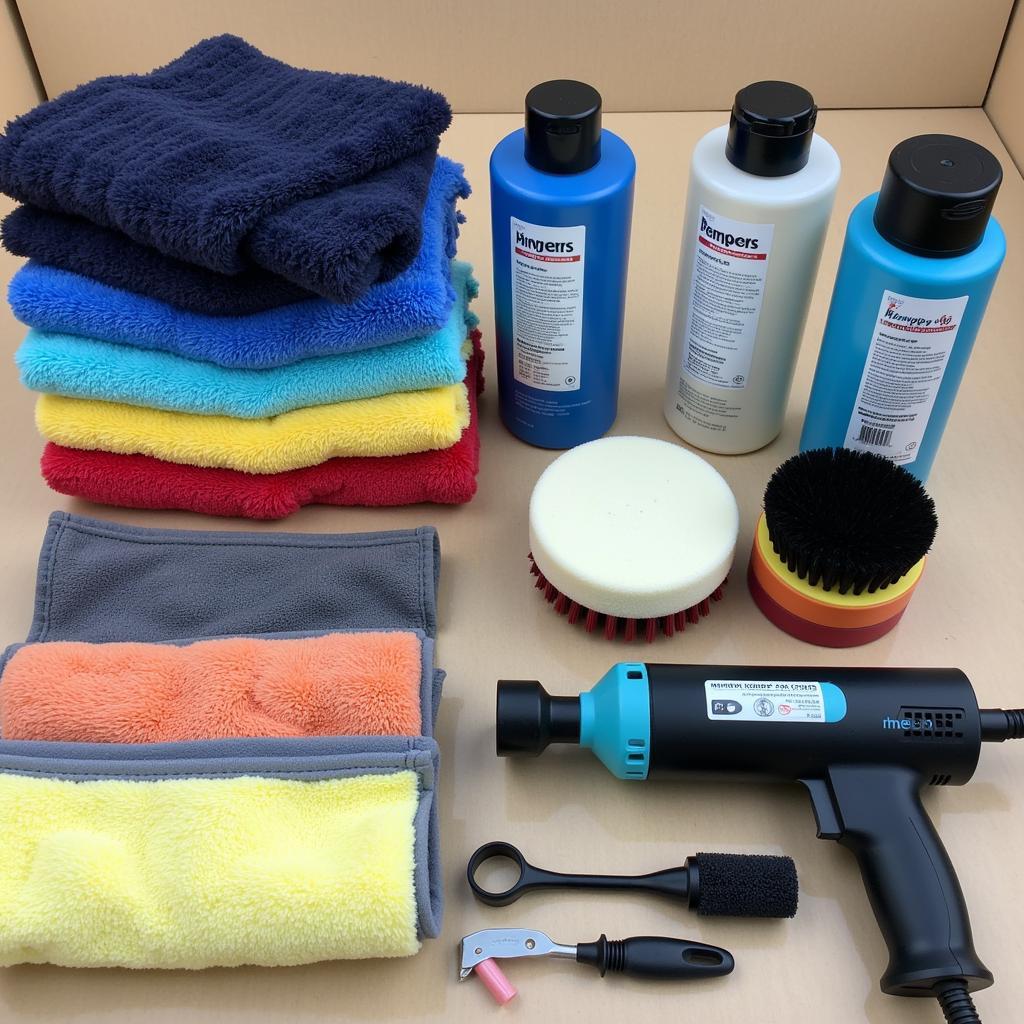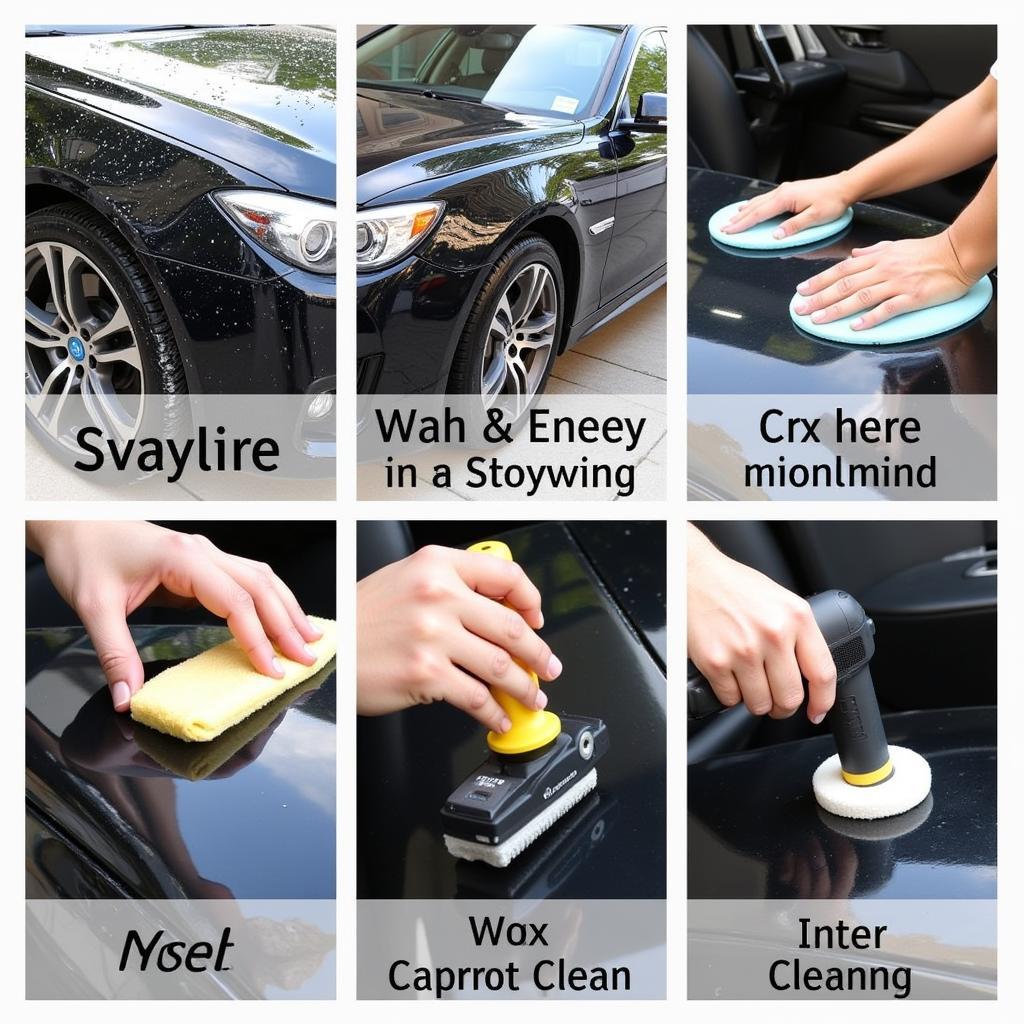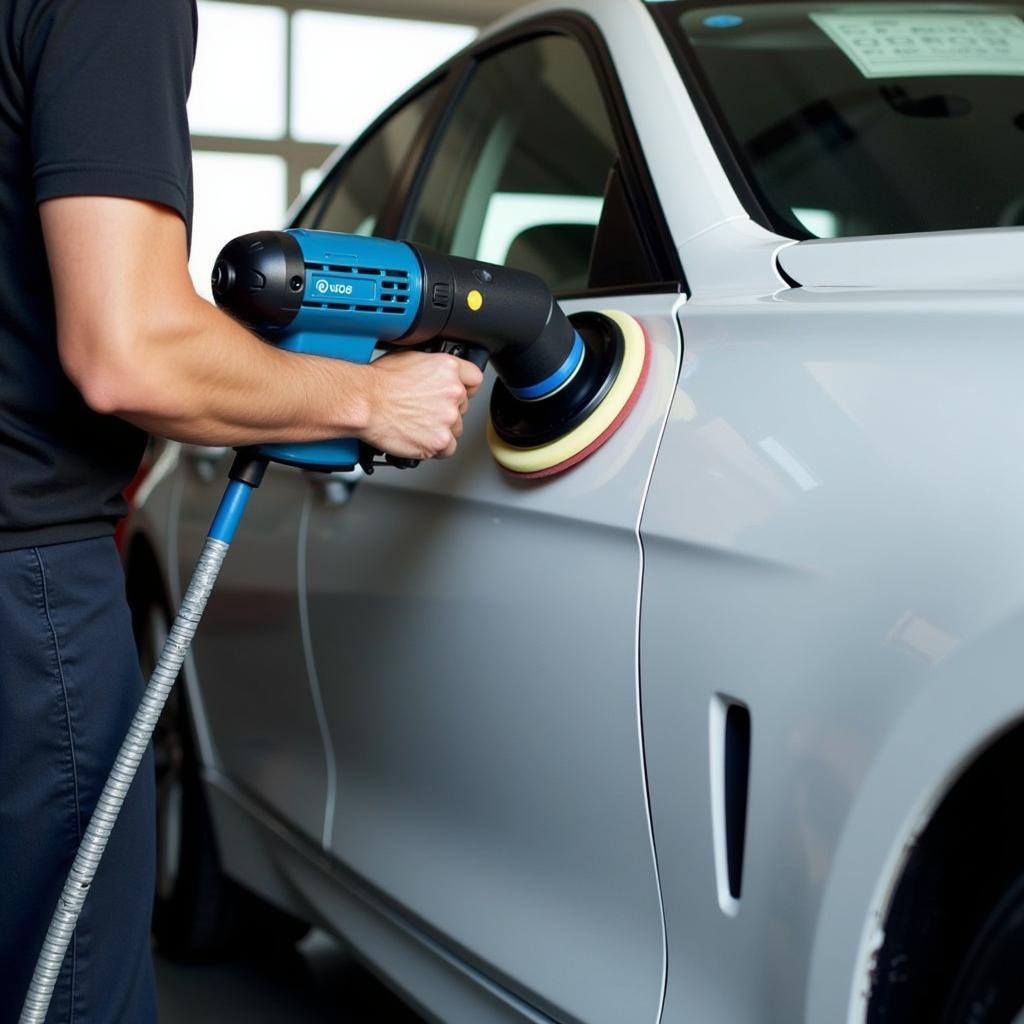Should I Detail My Car Myself? This is a question many car owners ask themselves, weighing the potential cost savings against the time and effort involved. Detailing your car can dramatically improve its appearance and even its resale value, but is it a DIY project or best left to the professionals? Let’s dive into the details.
Weighing the Pros and Cons of DIY Car Detailing
 DIY Car Detailing Supplies
DIY Car Detailing Supplies
Deciding to tackle car detailing yourself is a big decision. There are definite advantages, such as cost savings, but it’s crucial to consider the potential downsides. Are you prepared for the time commitment and physical effort? Do you have access to the necessary tools and a suitable workspace? These are all important factors to consider.
The Allure of DIY: Saving Money and Personal Satisfaction
Detailing a car professionally can be expensive. Doing it yourself can save a significant amount of money. There’s also a sense of satisfaction that comes with transforming your car’s appearance with your own hands. For many, this personal touch adds value beyond the monetary savings. If you’re looking to understand more about professional detailing, check out what does full car detail include.
The Challenges of DIY: Time, Effort, and Potential Pitfalls
DIY detailing requires a significant time investment, often several hours for a thorough job. It’s also physically demanding, involving a lot of scrubbing, polishing, and bending. Without the right techniques and products, you could even damage your car’s paintwork, costing you more in the long run. what is detailing car can help you understand the scope of a proper detail.
What Does Detailing a Car Myself Entail?
 Car Detailing Process Steps
Car Detailing Process Steps
Detailing involves much more than just a simple wash and wax. It’s a meticulous process that requires specific steps and products. A basic detail usually includes washing, drying, clay bar treatment, polishing, waxing, and interior cleaning. More in-depth detailing can involve paint correction, headlight restoration, and even engine bay cleaning. Knowing when does a car need headlight restoration auto detailing is helpful.
Essential Tools and Products for DIY Detailing
Having the right tools and products is crucial for a successful DIY detail. This includes various microfiber towels, wash mitts, a quality car wash soap, clay bar, polish, wax, and interior cleaners. Investing in quality products will protect your car’s finish and yield better results.
Step-by-Step Guide to Detailing Your Car at Home
- Washing: Start with a thorough wash to remove loose dirt and grime.
- Drying: Dry completely with a microfiber towel to prevent water spots.
- Clay Bar Treatment: Use a clay bar to remove embedded contaminants.
- Polishing: Polish to remove minor scratches and swirls.
- Waxing: Apply wax to protect the paint and enhance shine.
- Interior Cleaning: Vacuum, clean upholstery, and condition leather.
When Should I Consider Professional Detailing?
 Professional Car Detailing Service
Professional Car Detailing Service
While DIY detailing can be rewarding, sometimes it’s best to leave it to the professionals. If your car has significant paint damage, requires specialized services like paint correction, or you simply don’t have the time or inclination, a professional detailer is the best option. They have the expertise, tools, and experience to achieve a showroom finish. Curious about the impact of detailing on resale value? Learn more about does detailing car make more worth trade in. Also, understanding do they paint over chipped paint when getting car detailed might be beneficial.
“A professional detailer can not only restore your car’s finish but also protect it from future damage,” says renowned detailing expert, James Miller, owner of Pristine Auto Detailing. “Their expertise can save you time and money in the long run.”
Another expert, Sarah Chen, lead detailer at Immaculate Auto Spa, adds, “DIY detailing can be a great way to maintain your car between professional details, but for a truly transformative result, professional detailing is the way to go.”
Conclusion
Should I detail my car myself? The answer depends on your individual circumstances, budget, and skill level. While DIY detailing offers cost savings and personal satisfaction, it requires time, effort, and the right knowledge. If you’re up for the challenge, the results can be rewarding. However, for a truly flawless finish or if you have specific concerns, professional detailing is the best option. Ultimately, the decision of whether to detail your car yourself is a personal one.
FAQ
- What’s the difference between washing and detailing? Detailing goes beyond a basic wash, including deep cleaning, paint correction, and protection.
- How often should I detail my car? Ideally, every 3-6 months, or as needed depending on usage and environmental factors.
- What are the most important car detailing supplies? Microfiber towels, wash mitts, quality car wash soap, clay bar, polish, and wax are essential.
- Can I detail my car in direct sunlight? No, direct sunlight can cause cleaning products to dry too quickly, leaving streaks and spots.
- Is detailing worth the cost? Yes, detailing can enhance your car’s appearance, protect its paint, and even increase its resale value.
- How long does it take to detail a car? A thorough detail can take several hours, depending on the size of the vehicle and the services performed.
- Can I use household cleaners on my car? No, household cleaners can damage your car’s paint and interior.
Need help with your car detailing needs? Contact us via WhatsApp: +1(641)206-8880, or Email: [email protected]. Our 24/7 customer service team is ready to assist you.

Leave a Reply